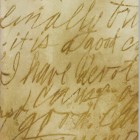Friend of the People 1999Scottish Opera
Read more about the opera Friend of the People
When Inés de Castro proved to be such a success in 1996, more than a decade since Scottish Opera's previous première, it meant that hopes were high for the start of a run of successful commissions. But although there were many good features in Friend of the People, it could not be accounted a success. David Horne is clearly a talented composer, able to write well for the voice, and a highly capable orchestrator. Much of the music sounded fabulous. He was also very good at composing a musical line which helped the singers project the words.
It was an ambitious plot for such music to carry. The large number of characters on stage, a cast of fourteen soloists, mostly doubling, if not trebling parts, could have made things impossibly complicated. As it was, the fundamental difficulty seemed the wordy, indeed by operatic standards positively verbose, libretto. But it was difficult to see where editorial work would improve matters, given the care with which the composer had set them all.
In an ideal world, Horne would have followed this piece with two or three others, in which he would have learned to take more care with his collaborators, or perhaps had a go at a full-scale revision. The music in Friend is far too good to go to waste, and Horne too good a composer to be lost to the operatic world.
As for the production and performance, it was hard to fault, and the dedication of all the participants was awe-inspiring. This was brought home particularly at the final performance. To lose one tenor is a misfortune. To lose two may not be the result of carelessness, but must have driven the management to distraction. If there had been a later performance for which the audience could have been offered tickets, presumably the show would have been cancelled. As it was, John Denham proved to be a thoroughly well-prepared cover for Philip Salmon's three roles (admittedly, two of them being quite short). Was he also the official cover for the second group of tenor roles? Whatever the reason, the solution adopted was for Ashley Catling to sing the roles from the stage box (a trick he repeated in 2011 for Clemenza di Tito in Perth), while the staff producer went on to mime the parts (rather as a young David Pountney did in the 1971 Rosenkavalier). The joins were hardly ever visible to the audience, and in all this was an extraordinary triumph showing the dedication and professionalism of the entire company.
Performance Cast
- Thomas Muir an advocate
- John James Appleton son of the American Consul, aged 12
- Robert Forsyth of the Friends
- Professor Millar of the Friends
- John Millar Jr of the Friends, the professor's son
-
Alexander Anderson-Hall (Exc Dec 11)
Ashley Catling (Dec 11 voice only)
Dafydd Burne-Jones (Dec 11 mime only)
- Colonel Dalrymple of the Friends
- Anna Barbauld a Whig lady of letters
- Charles Talleyrand a French diplomat
- Charles Grey a Whig MP
- Margaret Muir mother of Thomas Muir
- Rev James Lapslie Minister of Campsie
-
Philip Salmon (Exc Dec 11)
John Denham (Dec 11)
- Annie Fisher Mrs Muir's maid, in love with Thomas
- Robert Dundas Lord Advocate
- Lord Braxfield Lord Justice Clerk
- Jury Foreman
- Captain Campbell, RN of HMS Surprise
- Lieutenant Page, RN of HMS Surprise
- James Grant a transported convict
-
Philip Salmon (Exc Dec 11)
John Denham (Dec 11)
- Captain Dorr of the American merchantman Otter
- Count of Santa Clara Spanish Captain General
- Don Pedro aide to the Count
-
Philip Salmon (Exc Dec 11)
John Denham (Dec 11)
- Captain Fonnegra of the Spanish frigate Ninfa
- First Crewman
-
Alexander Anderson-Hall (Exc Dec 11)
Ashley Catling (Nov 11 voice only)
Dafydd Burne-Jones (Dec 11 mime only)
- Second Crewman
- Mayor of Bordeaux
- 'Ceres'
- 'Camillus'
-
Alexander Anderson-Hall (Exc Dec 11)
Ashley Catling (Dec 11 voice only)
Dafydd Burne-Jones (Dec 11 mime only)
- 'Cicero'
- Marianne 'La France'
